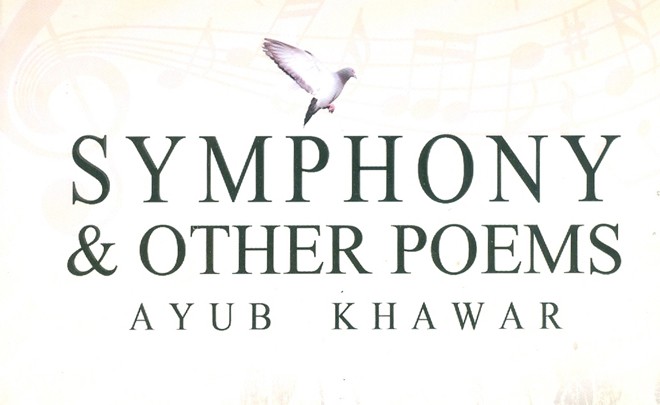
In translating Ayub Khawar’s poetry, Muhammad Shanazar has produced a worthwhile book

Ayub Khawar is now a poet with many published books and it was about time his works were translated into English. He was lucky that he found Muhammad Shanazar whose endeavour at translation can be found in Symphony and Other Poems. Khawar’s books of poetry that have been published in Urdu are Gul-e-Mausam, Tumhe Jaane Ki Jaldi Thi, Buhat Kuch Kho Gia Hai and Mohabbat Ki Kitab.
We all have lived through difficult times, especially in the recent past that has been racked with violence and a division that has shaken this society to its very core. Like all sensible people, Ayub Khawar too has been traumatised by what society has become and has been yearning for peace. The dream that Khawar shared with his generation was shattered and this left him feeling a heavy sense of sorrow.
O! My lost morn of the Beginning,
O! The Morn with bright forehead,
Who knows?
In which crease of the time,
In which cycle of the cyclone,
And wherein lies in the abysmal depths,
My morn of tomorrow.
Translation is difficult because it involves self-negation on the part of the translator. Still Shanazar has produced a worthwhile book; each translated poem overflows with personal pain gurgling out of the deep recesses of the poets’s heart. In most of the poems an elegiac tone prevails that affects the reader. Shanazar too went through feelings similar to the poet -- drifting on the potent waves of pathos.
Khawar yearns for global love, peace and harmony. In Symphony he vents his profound desire to see the world in perfect concord, surrounded by the distinct colours of the rainbow. This is similar to what Aftichia Kapardeli, a poet and critic from Greece, has written at the start of the book: she writes that she found "a light radiating therapeutic peace, love, beauty and dream with a majestic serenity that takes a breath through the fog of everyday life."
Shanazar finds Khawar’s imagery uncommon and vigorous, bearing colours, forms and shapes. The texture of the experience is complex but comprehensible. Echoing the same reaction in her preface Adriana Istrefi, the Albanian poet and representative of the World Poetry Movement and International Art, has said the poems are composed in such a style that when they start they appear to be soft, when they move on they push the reader through exclamatory calls and cries, hidden in the typological words of poetic confessions.
"I wouldn’t be here for a few days,
I would be for leave for some years
In times of some other cosmos;
In my absence you won’t be accountable,
You may tear to pieces anyone’s heart,
And make it desolate as you like,
No one will blame you for your savagery".
What is to be considered seriously is that there is an inevitable loss in translation and this reality is undisputable. Once we have reconciled with this truth, the next big step is to assess how the loss can be minimised. There is, of course, a school that considers that translation is a futile activity because the loss cannot be avoided. It is transference from one language to another without a soul or transmigration without a soul. In the end it is actually a creative act or very close to the creative act when that lost soul of one language is recreated in the soul of the language in which the translation is taking place. It is then not translation, at best an adaptation.
It is difficult to make any translation a truly representative one, especially if there is a translation of some of the work. Ideally, it should aspire to be of all the works of the poet. Poetry does go through a certain progression and what has been written in one phase might be totally different from the second or the third phase. It also ascertains that the poet has progressed and developed as he has grown in experience and has seen more of the world. The translation should be reflective of that growth or lack of it as well.
It is hoped that this will not been the last translation of the works of Ayub Khawar but the first, and that there will be more translations as there should be of Urdu poetry and fiction in general.